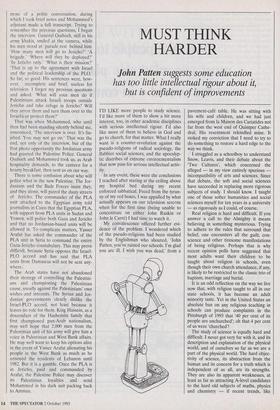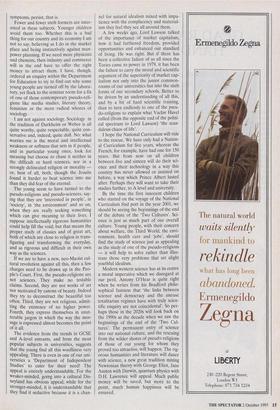MUST THINK HARDER
John Patten suggests some education
has too little intellectual rigour about it, but is confident of improvements
I'D LIKE more people to study science. I'd like more of them to show a bit more interest, too, in other academic disciplines with serious intellectual rigour. I'd also like more of them to believe in God and go to church, for that matter. What I really want is a counter-revolution against the pseudo-religions of radical sociology, the flabbier social sciences, and the apocalyp- tic diatribes of extreme environmentalism that now pass for serious intellectual activ- ity.
In any event, these were the conclusions I reached after staring at the ceiling above my hospital bed during my recent enforced sabbatical. Freed from the tyran- ny of my red boxes, I was appalled by what actually appears on our television screens when for the first time (being unable to concentrate on either John Ruskin or John le Carre) I had time to watch it.
My convalescence offered further evi- dence of the problem. I wondered which of the pseudo-religions had been studied by the Englishman who shouted, 'John Patten, you've ruined our schools. I'm glad you are ill. I wish you was dead,' from a pavement-café table. He was sitting with his wife and children, and we had just emerged from la Maison des Cariatides not far from the west end of Quimper Cathe- dral. His resentment rekindled mine. It stoked my conviction that I need to try to do something to restore a hard edge to the way we think.
I struggled as a schoolboy to understand Snow, Leavis, and their debate about the 'Two Cultures', which concerned the alleged — in my view entirely spurious — ideompatibility of arts and sciences. Since that debate, the soft and social sciences have succeeded in replacing more rigorous subjects of study. I should know. I taught one of those softer humanities and social sciences myself for ten years in a university — as rigorously as I could, of course.
Real religion is hard and difficult. If you answer a call to the Almighty it means believing in something mysterious. Trying to adhere to the rules that surround that belief, one encounters all the guilt, con- science and other tiresome manifestations of being religious. Perhaps that is why recent opinion polls have suggested that most adults want their children to be taught about religion in schools, even though their own church attendance, if any, is likely to be restricted to the classic trio of baptism, marriage and burial.
It is an odd reflection on the way we live now that, with religion taught to all in our state schools, it has become an adult minority taste. Yet in the United States an absolute ban on any religious teaching in schools can produce complaints in the Pittsburgh of 1993 that '40 per cent of its people are unchurched'; oh that 4 per cent of us were `churchedi The study of science is equally hard and difficult. I never got very far with it, and its description and explanation of the physical world, and of ourselves so far as we are a part of the physical world. The hard objec- tivity of science, its abstraction from the human and its concern for a truth which is independent of us all, are its strengths. They are also its apparent weaknesses, at least as far as attracting A-level candidates to the hard old subjects of maths, physics and chemistry — if recent trends, like symptoms, persist, that is.
Fewer and fewer sixth formers are inter- ested in these subjects. Younger children avoid them too. Whether this is a bad thing for our country and its economy I am not to say, believing as I do in the market place and being instinctively against man- power planning. If we need more physicists and chemists, then industry and commerce will in the end have to offer the right money to attract them. I have, though, ordered an enquiry within the Department for Education to try to find out why some young people are turned off by the labora- tory, yet flock to the seminar room for a fix of one of those contemporary pseudo-reli- gions like media studies, literary theory, feminism or the more radical whores of sociology.
I am not against sociology. Sociology in the tradition of Durkheim or Weber is all quite worthy, quite respectable, quite con- servative and, indeed, quite dull. No: what worries me is the moral and intellectual weakness or softness that sets in if people, and in particular young ones, look for meaning but choose to chase it neither in the difficult or hard sciences, nor in a strongly delineated religion or morality — or, best of all, both, though the Jesuits found it harder to beat science into me than they did fear of the eternal.
The young seem to have turned to the pseudo-religions and pseudo-sciences, say- ing that they are 'interested in people', in 'society', in 'the environment' and so on, when they are really seeking something which can give meaning to their lives. I suppose intellectually rigorous humanities could help fill the void; but that means the proper study of classics and of great art, both of which are close to religion in trans- figuring and transforming the everyday, and as rigorous and difficult in their own way as the sciences.
If we are to have a new, neo-Maoist cul- tural revolution against all this, then a few charges need to be drawn up in the Peo- ple's Court. First, the pseudo-religions are not sciences. They make no testable claims. Second, they are not works of art nor motivated by canons of beauty. Indeed they try to deconstruct the beautiful too often. Third, they are not religious, admit- ting the existence of no higher power. Fourth, they express themselves in unut- terable jargon in which the way the mes- sage is expressed almost becomes the point of it all.
The evidence from the trends in GCSE and A-level entrants, and from the most popular subjects in universities, suggests that the young find all this woolliness very appealing. There is even in one of our uni- versities a 'Department of Independent Studies' to cater for their need! The appeal is entirely understandable. For the weaker-minded, going into a cultural Dis- neyland has obvious appeal; while for the stronger-minded, it is understandable that they find it seductive because it is a chan-
nel for natural idealism mixed with impa- tience with the complacency and material- ism they feel they see all around them.
A few weeks ago, Lord Lawson talked of the importance of market capitalism, how it had furthered freedom, provided opportunities and enhanced our standard of living. He was right. But if there has been a collective failure of us all since the Tories came to power in 1979, it has been the failure to carry the moral and scientific argument of the superiority of market cap- italism not only into the junior common- rooms of our universities but into the sixth forms of our secondary schools. Better to be driven by an understanding of all this, and by a bit of hard scientific training, than to turn endlessly to one of the pseu- do-religions to explain what Vaclav Havel called (from the opposite end of the politi- cal spectrum to Lord Lawson) 'the scan- dalous chaos of life'.
I hope the National Curriculum will ride to the rescue. We have only had a Nation- al Curriculum for five years, whereas the French, for example, have had one for 150 years. But from now on all children between five and sixteen will do their sci- ence and their technology in a way this country has never allowed or insisted on before, a way which Prince Albert lusted after. Perhaps they will want to take their studies further, to A level and university.
By the time the first innocent children who started on the voyage of the National Curriculum find port in the year 2001, we should be seeing the beginnings of the end of the debate of the 'Two Cultures'. Sci- ence is just as much part of our overall culture. Young people, with their concern about welfare, the Third World, the envi- ronment, health care and 'jobs', should find the study of science just as appealing as the study of one of the pseudo-religions — it will help to solve rather than illus- trate those very problems that set alight youthful idealism.
Modern western science has at its centre a moral imperative which we disregard at our peril. Antony O'Hear is quite right when he writes from his Bradford philo- sophical fastness that 'the links between science and democracy and the unease totalitarian regimes have with truly scien- tific enquiry are not coincidental'. So per- haps those in the 2020s will look back on the 1990s as the decade when we saw the beginnings of the end of the 'Two Cul- tures'. The permanent entry of science into our national culture, and the rescuing from the wilder shores of pseudo-religions of those of our young for whom they proved too attractive, will happen. The rig- orous humanities and literature will dance with science, a new great tradition mixing Newtonian theory with George Eliot, Jane Austen with Darwin, quantum physics with D.H. Lawrence will appeal. Much public money will be saved; but more to the point, much human happiness will be ensured.



















































 Previous page
Previous page